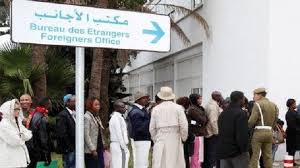
Migration: Morocco Sets Example for the Rest of Africa
 Over Twenty African ministers and government officials met Tuesday in Rabat (Morocco’s capital) to harmonize African countries’ stands and vision regarding the issues related to migration.
Over Twenty African ministers and government officials met Tuesday in Rabat (Morocco’s capital) to harmonize African countries’ stands and vision regarding the issues related to migration.
The African Union ministerial conference aimed to work out an African agenda on migration, based on an inclusive and participative approach. Participants agreed on the shared responsibility to tackle this issue, stressing the need to respect human rights, support socioeconomic development and fight against illegal migration.
They also called for the opening of legal migration routes and the facilitation of the movement of entrepreneurs, students, researchers and artists.
The ministerial conference on migration is a part of consultations with African partners to elaborate an African Agenda on migration to be submitted to the next AU Summit for approval.
Actually, King Mohammed VI has been named the leader in charge of the migration issue within the African Union, and is expected to submit proposals on charting a real African Agenda on migration to the next AU Summit to be held by the end of the current month.
Outlines of these proposals were submitted in a preliminary note to the AU presidency during the previous African summit in July 2017.
The preliminary note outlined the steps that should be taken to tackle migration notably through adopting national policies, improving sub-regional coordination, and harnessing continental and international efforts to ensure an adequate management of migration.
The Moroccan Monarch argues that African countries should speak with one voice, in accordance with their own work plan and their own Agenda that should involve four levels of action: national, regional, continental and international.
Morocco was picked to host the Tuesday conference owing to the Monarch’s commitment to guarantee immigrants’ dignity and well-being and to Morocco’s noteworthy experience in migration management, and its support and respect of migrants’ rights, especially those from sub-Saharan Africa.
Besides, the North African Kingdom co-chairs with Germany the Global Forum on Migration and Development (GFMD) aimed at contributing to the United Nations’ Global Compact on Migration. The Compact is intended to constitute a strong signal of the international community for an enhanced global migration policy.
Morocco will also host later this year the intergovernmental conference on international migration. The conference, due Dec.10-11, is expected to work out a global compact for safe, orderly and regular migration.
The global compact for migration will be the first, intergovernmentally negotiated agreement, prepared under the auspices of the United Nations, to cover all dimensions of international migration in a holistic and comprehensive manner.
In the New York Declaration for Refugees and Migrants, adopted in September 2016, the General Assembly decided to develop a global compact for safe, orderly and regular migration. The process to develop this global compact for migration started in April 2017.
In recent years, Morocco has become a country of destination rather than a transit country for refugees and migrants, aiming to reach Europe. In this connection, the North African Kingdom launched regularization plans for migrants and refugees, who wish to settle in the country.
Morocco has revised its national immigration and asylum strategy to make it in line with the country’s human rights commitment, guaranteeing migrants’ access to basic services including, education, social housing, and employment.
